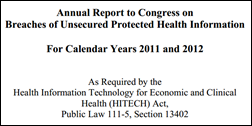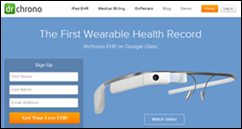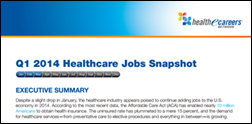The article about Pediatric Associates in CA has a nugget with a potentially outsized impact: the implication that VFC vaccines…
News 6/17/14
Top News

A CommonWealth Fund survey of 11 countries ranks the U.S. first in expense, yet dead last in measures of "efficiency, equity, and outcomes." The U.S. earned similar accolades in 2010, 2007, 2006, and 2004. The survey report notes that “U.S. physicians face particular difficulties receiving timely information, coordinating care, and dealing with administrative hassles. Other countries have led in the adoption of modern health information systems, but U.S. physicians and hospitals are catching up as they respond to significant financial incentives to adopt and make meaningful use of health information technology systems. …” “Catching up” may not be the most accurate phrase to use at this point, as ONC stimulus money slowly peters out, competing organizations attempt to determine the future state of interoperability, and EHR end users remain vocal about inefficient, HIT-inflicted workflows.
Acquisitions, Funding, Business, and Stock

Franklin, TN-based Cumberland Consulting Group acquires Cipe Consulting Group, a 50-consultant, Seattle-based EHR and RCM consulting company. The acquisition marks the second in less than a year for Cumberland, which acquired Mindlance Life Sciences last November.

The viability of HIE commercial ventures is called into question with the closing of Thrive HDS, a commercial offshoot of the Indiana Health Information Exchange formed just nine months ago, which specialized in clinical data repository services and related analytics.
Announcements and Implementations

FHP Health Center (Guam) selects the eClinicalWorks EHR to help its 12 facilities transition to paperless practices, meet Meaningful Use objectives, and transition to ICD-10. While FHP’s history doesn’t go back quite as far as Kaiser Permanente’s, it’s interesting to note that the 41-year-old organization was founded as part of the island’s TakeCare HMO.

In additional eCW news, Family HealthCare Network (CA) announces new functionalities within its My Health/Mi Salud patient portal including appointment requests, prescription refills, secure messaging, and access to personal health records. The network implemented the MED3000 (now McKesson) InteGreat EHR in 2009, and received more than half a million Meaningful Use incentive dollars as a result. One can only assume FHN is well on its way to meeting Stage 2 MU objectives.

Oregon Outpatient Surgery Center launches the “Save Our Veterans” program, which offers free surgeries to local veterans, as well as free pre- and post-treatment, including medical services and supplies. The center’s offer is a timely one given that a recent national audit found that the Portland VA Medical Center had the nation’s fifth-longest wait time – an average of 80 days – for new patient primary care.
Government and Politics

ONC announces that its first Chief Privacy Officer Joy Pritts, JD has resigned after four years on the job.

The tweet above highlights what Eric Boehme, associate director of informatics at Vanderbilt University Medical Center (TN), worries is the unstable future of the Meaningful Use program: “ONC has lost a significant portion of its funding as the stimulus money dries up. Recently, some members of Congress questioned how much ONC should regulate HIT. ONC National Coordinator, Farzad Mostashari, CMS Administrator, Marilyn Tavenner, and the HSS Secretary, Kathleen Sebelius have all resigned.” Add Joy Pritts to his list and his concern becomes even more valid.

In the meantime, the American Geriatrics Association is kind enough to remind Medicare-eligible physicians that they have until July 1 to apply for Meaningful Use hardship exceptions.

The HHS Office for Civil Rights issues its annual breach report to Congress, which finds that OCR received 236 reports of breaches involving 500 or more individuals occurring in 2011, and 222 reports of large breaches occurring in 2012. Nearly 15 million individuals were affected. Top causes of these larger breaches include hacking/IT incident; theft; unauthorized access, use, or disclosure; and improper disposal.
Innovation and Research

Mr. H. and The Daily Show’s Jon Stewart may give Google Glass short shrift, but it seems to be making further inroads into mainstream medical practice nonetheless: Drchrono integrates Glass into its free EHR platform, creating what it refers to as the first “wearable health record.” The company believes that the “future of a doctor is one where they have an iPad, an iPhone, a laptop, and Glass all connected through a mobile EHR platform so they can operate efficiently and spend more one-on-one time with patients instead of processing paperwork.” This vision of a hyper-connected future sounds intriguing; you have to wonder, however, how much that prediction will play out in present day Glass use.

A new report on first-quarter recruiting data shows that physician job postings account for a majority 44 percent of all those posted, while IT-related jobs follow at 23 percent. Project management, software development, health information administrator, systems analysis, and analyst HIT showed the most growth in number of healthcare IT jobs posted year over year. Sadly, but not unexpectedly, the report also found a 49-percent career dissatisfaction rate among physicians, with the percentage even higher in the general medicine and primary care specialties.
A separate study finds that government and military employment, including the VA, is the last choice for physicians when it comes to workplaces. Private practice and hospital employment were the obvious top choices, while just 2 percent of respondents ticked the government/military box.
People

The Ohio Association of Community Health Centers names Theodore Wymyslo, MD (Ohio Department of Health), chief medical officer, and promotes Julie DiRossi King to COO.
Other

A New York Times op-ed highlights what many in the industry are thinking: Apple’s upcoming HealthKit app may not be the game changer many digital health pundits would like it to be. The author cites several reasons, including lack of true interoperability between healthcare technologies (not to mention Apple and its new HealthKit partner Epic); a lack of interest in sharing data on the part of patients (“no one likes to be nagged”); and the fact that technology, no matter how new and shiny it may be, is only as good as the people using it. The biggest barrier to HealthKit’s success, however, may be physicians, many of whom are likely not set up to incorporate patient-generated data into the EHRs some of them already dislike.
